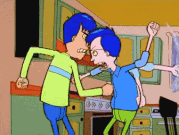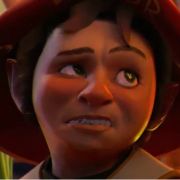|
Nitrousoxide posted:How much do you prep before starting writing? Like I have some general themes and ideas for the characters of a story, but the story arcs and locations of the book are not set at all. Should I have an outline of all the chapters before I starting writing the first word of the introduction? I've been thinking about this a lot recently. I've been writing for years but had countless false starts, abandoned stories, things that fundamentally haven't worked, and now I've finally broken free of that cycle and I'm 25k words into a novel and have a couple of short stories in the pipeline. For me the change was driven by comprehensive prep, but not in the way people kept trying to teach me. I don't have chapter outlines. Hell, I'm not even sure where to place chapter breaks! What I do have is reams and reams of material on the characters, setting, themes, general character arcs, antagonists, and intended outcomes. I have a conflict, an ending, and a dozen or so scenes along the way that are clear in my mind, moments of the narrative I know will happen. The trick seems to be filling the gaps between them - connecting up all the dots. That's a good metaphor for it. I feel like I've got a map made up of dots and the writing comes so much easier because all I gotta do is figure out what kind of shape I want to make out of them.
|
|
|
|

|
| # ? May 15, 2024 02:35 |
|
I got highlights in my head, then purposefully don't think about it until I sit in front of the computer. Otherwise the excitement dies, and I lose interest. Half the fun is seeing what pours out and buttress the flashes going off in my head.
|
|
|
|
Shageletic posted:I got highlights in my head, then purposefully don't think about it until I sit in front of the computer. Otherwise the excitement dies, and I lose interest. Half the fun is seeing what pours out and buttress the flashes going off in my head. This is more or less my modus operandi as well. When I sit down, I have an idea of the how my story begins and how it ends, as well as a handful of moments or scenes to get me from one end to the other. Outside of that, I don't really do any pre-planning. Sometimes I don't even know who the characters are going to be aside from the main protagonist(s) and the main antagonist(s). This method has it's pros and cons, as any method will. Hell, I can even see the value of rigorous preparation with outlines and character bios and world maps and whatever else, especially if your story involves multiple books. But for me, the purest form of my creativity comes when I'm making it up as I go along, and I tend to enjoy re-reading those stories much more than my carefully crafted ones. Edit: it should be mentioned I'm talking mostly about first drafts here. Obviously once you get past those, a story needs to take on some semblance of coherency and consistency and you need to edit and rewrite with that in mind. But that's a whole different discussion. Cpt. Mahatma Gandhi fucked around with this message at 21:52 on Mar 5, 2014 |
|
|
|
The freeflow no planning works fine for short stories. I've never finished anything longer without an outline.
|
|
|
Cpt. Mahatma Gandhi posted:This is more or less my modus operandi as well. When I sit down, I have an idea of the how my story begins and how it ends, as well as a handful of moments or scenes to get me from one end to the other. Outside of that, I don't really do any pre-planning. Sometimes I don't even know who the characters are going to be aside from the main protagonist(s) and the main antagonist(s). I feel like this would hard to pull off for the far future sci fi I have in mind. I need to do a lot of world building and the rules of the tech need to consistent. That said, once the world has been set up through research and a outline I think something like that could work.
|
|
|
|
|
I typically don't have an outline when I start, but I'm not sure it's a process I could recommend to others. It gets hard to fill those in-between sections of your book without a list or plan of some sort. Most of my history is in film, so a lot of my ideas come to me as scenes I would love to make for a movie. When I realize I don't have millions of dollars at my disposal, it turns into "Well, poo poo, guess I'll make a book out of it." So, that happens. I kind of like stringing together various scenes like that, though. A lot of times, my story and characters change in ways that I really didn't expect as the story flows on. Your own book ends up surprising you. That makes it more entertaining to read, I think, so long as you know how to wrangle it down right. Of course, it also means you'll have to go back and do a lot of editing and rewrites to make sure all those ends tie together with some semblance of coherency. My current novel is having the issue where I knew the kind of villain I wanted, and how it fit into those individual scenes, but now I have to go back and actually build a lot more tension and examples of why the villain is bad and what they've done, which can be a little difficult when you're already 65k words into a story. Really, there's no right or wrong way to it, as long as it works for the writer.
|
|
|
|
I start by opening q10 with absolutely nothing in mind and the first time I sit and think "what now" I begin planning out where, if anywhere, the fart-filled wordery I just made will go. This step usually involves transferring the text into Word or something. Then, it's like a few people have said; I come up with guide posts of stuff I'd like to write and work out how to string it together. It works better than anything else I've tried, but that don't mean it works good.
|
|
|
|
Nitrousoxide posted:I feel like this would hard to pull off for the far future sci fi I have in mind. I need to do a lot of world building and the rules of the tech need to consistent. That said, once the world has been set up through research and a outline I think something like that could work. Don't get lost in your world-building though. I recommend coming up with a general setting, and then start writing. As you go, you'll happen on some piece of technology or cultural thing or whatever, and you can stop to figure it out then. If you just spend months building the world, you'll never get anywhere. I also caution against the idea of "rules." Whether it's magic or advanced technology that may as well be magic, it should work for the story, not the other way around. If you come up with some spergy D&D ruleset for your magitech, you'll just be limiting yourself. It's your drat story, if you suddenly decide that your cyberwizards can time travel, then by god they should be able to time travel!
|
|
|
|
Martello posted:Don't get lost in your world-building though. I recommend coming up with a general setting, and then start writing. As you go, you'll happen on some piece of technology or cultural thing or whatever, and you can stop to figure it out then. If you just spend months building the world, you'll never get anywhere. I concur with this wholeheartedly. Most readers, when they sit down with a work of fiction, are looking for a good story. Yes, a beautifully realized world with fascinating details is an important element to crafting a good novel, but if the story is a slog then it typically doesn't matter how brilliant your setting is, as readers will get bored. Honestly I wouldn't worry about keeping tech "consistent" with a first draft. In the second or third? Sure, that poo poo needs to have sense and purpose, but your initial goal should be to get the story out and make sure it's compelling and coherent. If I remember correctly, Stephen King mentions in him memoir that he basically doesn't do any research or planning before starting a first draft. If he comes across a scientific or historical fact that's imperative to his story, he just bullshits the explanation and then researches it and corrects it in further drafts. You may want to try a similar approach with regards to the technology of your far future sci-fi, just so you can get the words on the page and figure out where the story needs work.
|
|
|
|
Martello posted:I also caution against the idea of "rules." Whether it's magic or advanced technology that may as well be magic, it should work for the story, not the other way around. If you come up with some spergy D&D ruleset for your magitech, you'll just be limiting yourself. It's your drat story, if you suddenly decide that your cyberwizards can time travel, then by god they should be able to time travel! But rules are in service of the story. Even if they're unspoken in the story itself, I'm sure that the author has some kind of of idea what their protagonists and antagonists can do in the world. Rules that people have to follow shape them, and make them work with the tools they have. I think that can lead to better results than writing "suddenly, Bob could fly" out of nowhere on page 215, when up until now, Bob has been a perfectly ordinary plumber.
|
|
|
|
Martello posted:Don't get lost in your world-building though. I recommend coming up with a general setting, and then start writing. As you go, you'll happen on some piece of technology or cultural thing or whatever, and you can stop to figure it out then. If you just spend months building the world, you'll never get anywhere. I mostly agree with this sentiment but some caution is warranted. If there was some previous situation that could have been solved with time travel but wasn't then you need a good explanation of why, otherwise you'll wreck your readers suspension of disbelief. So while you should feel free to violate your 'rules' at the level of the narrative, doing it from chapter to chapter can destroy the internal coherency of the narrative.
|
|
|
|
Stabbey_the_Clown posted:But rules are in service of the story. Even if they're unspoken in the story itself, I'm sure that the author has some kind of of idea what their protagonists and antagonists can do in the world. Rules that people have to follow shape them, and make them work with the tools they have. I think that can lead to better results than writing "suddenly, Bob could fly" out of nowhere on page 215, when up until now, Bob has been a perfectly ordinary plumber.
|
|
|
|
Stabbey_the_Clown posted:But rules are in service of the story. Even if they're unspoken in the story itself, I'm sure that the author has some kind of of idea what their protagonists and antagonists can do in the world. Rules that people have to follow shape them, and make them work with the tools they have. I think that can lead to better results than writing "suddenly, Bob could fly" out of nowhere on page 215, when up until now, Bob has been a perfectly ordinary plumber. Actually that would be a classic piece of magical realism, and if it serves the story, then who cares? Read The Fortress of Solitude to see what I'm talking about.
|
|
|
|
What it boils down to is that when things happen in your story, they need to have a reason. Suddenly someone can fly, for instance. The reason might be because that's how the reality of your story works, and you're using it to establish mood. It might be because it illustrates the ephemeral nature of identity. Anything that's going on in your story should have a reason, in the world of the story, or out of it, or both.
|
|
|
|
"just write an interesting story" or "if it serves the story, who cares" are phrases that, while accurate, probably obscure more than they illuminate in this particular context. Yes of course you should always do anything that will make your story better, that is the point of being a writer, but the question here is whether ignoring any internal rules or logic within your story actually is conducive to making it more interesting or enjoyable. If you're writing magical realism then maybe the answer is yes, but if you're writing a hardboiled detective story or a heart wrenching tale of survival in a war torn country or a quirky romance and suddenly you have the characters acting in totally new ways or displaying capabilities they didn't previously have (and which they presumably would have used in previous situations) then that isn't necessarily going to improve your story even if it makes that particular scene more engaging. Like I said, the way this advice is being framed makes it hard to object to it. If having your character suddenly develop the ability to fly, or time travel, or play the Piano at a concert level, actually makes your story better, then go ahead and do it. But if you've previously established a realistic setting, or you've previously placed the character in a situation where they logically would have used that ability and they don't, then you probably aren't actually making your story better despite what you might think. Whether or not your story has 'rules' it should have enough internal coherency and logic actually keep the reader engaged. If your story starts out as a realistic piece of literary fiction and suddenly transitions into magic realism half way through you had better make damned sure that you're actually pulling it off because otherwise you're just going to lose your audience.
|
|
|
|
See, that's what I mean by use editing to back up the rules. If the story becomes better through your detective suddenly flying, throw that poo poo in, that's dope as hell. Just, you know, use your edits to plant the seeds of flight. Build your rules and laws in retrospect.
|
|
|
|
The only rules most of us need are rules of character and behaviour - what different actors would or wouldn't do, and why those difference are likely to make poo poo get interesting.
|
|
|
|
I'm definitely on the side of flying by the seat of your pants. After all, no one's first draft makes total sense. Do what you want, fix it later or decide that it didn't work once you know the story and take it back out
|
|
|
|
For some reason I'm useless when it comes to writing outlines. I've tried to do it so many times. I did a whole 120 k novel without it.
|
|
|
|
I think a happy middle ground here is preferable in my experience. Don't create enough rules or structure that they restrict your ability to tell the story, but also don't abjectly contradict what you have already written. You'll create plot holes and headaches later on down the line. You might as well write a mostly coherent and contiguous first draft than try to polish a piece of poo poo. For example, something you don't have to go far to find in amateur fantasy writing goes something like this: A world is post-apocalyptic, or on the cusp of industrial. As such things like guns etc. are rare/exotic, meaning that most people use swords, bows or crossbows etcetc. But as the stakes rise as the plot progresses, a character or several might obtain a gun and in order to maintain a sense of balance, the author feels obliged to arm their antagonists with guns, and so on and so forth until the climax is more like a Western shootout. They effectively write themselves into a corner where they have to override various world details inserted earlier. This cannot be undone in a second draft without serious, serious revamping and consistency checking. You see this kind of thing in games all the time, where an enemy is made out to be special and rare, yet by the endgame they are pretty much just cannon fodder.
|
|
|
|
Jeza posted:I think a happy middle ground here is preferable in my experience. Don't create enough rules or structure that they restrict your ability to tell the story, but also don't abjectly contradict what you have already written. You'll create plot holes and headaches later on down the line. I think that is a pretty good example, especially the game thing. It happens really bad in Final Fantasy Tactics where once the rare gun is found with the guy who uses it the store just carries them and all. I am trying to be careful not to claim anything is rare and then have it start showing up everywhere without an explicit plot reason.
|
|
|
|
Usually, when inspiration strikes I let it simmer for a good while. Often enough, it's just an image I find striking, or a phrase, or something far too small to become a story, that gradually kind of congeals with other stuff as I go about my life, read, watch films, etc. Then, when I have a good idea of what I want to do, I'll make a story skeleton, but that's more motivational than anything else. It helps me to remember little details I like, but mainly it's that I don't feel as intimidated when I can sit down and I know that this particular block is "all i need to do". There's a sense of accomplishment that comes with turning a blurb into actual prose, and having one less remaining to do. I almost always write chronologically, as well; I'm not the kind of guy who can skip ahead and write what is most interesting to me first.
|
|
|
|
Anonymous Robot posted:I almost always write chronologically, as well; I'm not the kind of guy who can skip ahead and write what is most interesting to me first. That actually brings up another good question: how many of you guys tend to go chronological and how many will write scenes then stitch them together later? I couldn't imagine writing middle pieces of a book first. It seemed to take me longer and kill my motivation more than anything the one time I tried to just write the "cool" scenes first.
|
|
|
|
Axel Serenity posted:That actually brings up another good question: how many of you guys tend to go chronological and how many will write scenes then stitch them together later? Chronological for me - I like going along with the story as it's unfolding 
|
|
|
|
Cpt. Mahatma Gandhi posted:Chronological for me - I like going along with the story as it's unfolding Same for me. I'm always afraid that if I skip ahead and do the big exciting scenes first I won't have the motivation to go back and write all of the smaller scenes that give the big moments meaning.
|
|
|
|
Some of you guys are really misinterpreting what I said.Stabbey_the_Clown posted:But rules are in service of the story. Even if they're unspoken in the story itself, I'm sure that the author has some kind of of idea what their protagonists and antagonists can do in the world. Rules that people have to follow shape them, and make them work with the tools they have. I think that can lead to better results than writing "suddenly, Bob could fly" out of nowhere on page 215, when up until now, Bob has been a perfectly ordinary plumber. I didn't say that you should just change something completely near the end of the story. Bob the plumber being able to fly on page 215 is a stupid strawman. My example was "cyberwizards can time travel" meaning that maybe when the writer started the story, they couldn't, but then on a second draft he decided they needed time travel. Granted, I think time travel usually sucks, but that's not the point. The point is that if he started the story after setting up all these spergy rules and restrictions for his world, he's going to limit himself to those rules when he should really just be writing the most interesting story possible. Symptomless Coma posted:The only rules most of us need are rules of character and behaviour - what different actors would or wouldn't do, and why those difference are likely to make poo poo get interesting. Yes. Helsing posted:"just write an interesting story" or "if it serves the story, who cares" are phrases that, while accurate, probably obscure more than they illuminate in this particular context. Yes of course you should always do anything that will make your story better, that is the point of being a writer, but the question here is whether ignoring any internal rules or logic within your story actually is conducive to making it more interesting or enjoyable. If you're writing magical realism then maybe the answer is yes, but if you're writing a hardboiled detective story or a heart wrenching tale of survival in a war torn country or a quirky romance and suddenly you have the characters acting in totally new ways or displaying capabilities they didn't previously have (and which they presumably would have used in previous situations) then that isn't necessarily going to improve your story even if it makes that particular scene more engaging. Again, I don't think anybody's suggesting that you should suddenly give your character a superpower near the end of a story. When I said "suddenly" I meant, "on the second draft, Author X realized his story would be better with uplifted dogs with grenade launchers." Your story definitely has to stay internally consistent. We were also specifically talking about sci-fi and fantasy, so I dunno where this plumber/piano maestro/magical realism poo poo is coming from.
|
|
|
|
Axel Serenity posted:That actually brings up another good question: how many of you guys tend to go chronological and how many will write scenes then stitch them together later? I usually have an idea for a general overarching plot, and if I get an idea for an interesting scene, I write that down - there's no harm in writing down ideas. But I still will go back and start writing chronologically, because that makes sure that the scenes will still make sense in context, and that they feel "earned". Sometimes the scenes no longer make sense or kill the pacing and have to be removed, sometimes they need to be altered, but I don't think that writing them was a waste of time even if I do end up ditching them.
|
|
|
|
The thing I'm working on now, I'm writing it scene-by-scene in order. I feel like if I don't write it in order, I'll miss out on new ideas which change how later stuff goes. Like, I didn't put into the outline for Eleanor to catch a bullet in the shoulder, but while writing the scene it made sense. And now that informs her behaviour through the rest of the story and led to a scene with a doctor and, more importantly, the doctor's son who is now a character previously nameless from the outline intended to appear in other scenes. When I wrote screenplays in college, I did them out of order all the time and it was really awful because I kept coming up with new ideas and had to either discard them or rewrite other stuff to make it work. But with either approach, I find the outline stage is really fun. It's where I'm free to throw huge ideas around and go "what if Bram Stoker had a sword fight with a vampire lord on the roof of a castle during a lightning storm?" It's actually writing those scenes which becomes a pain in the rear end 
|
|
|
|
Axel Serenity posted:That actually brings up another good question: how many of you guys tend to go chronological and how many will write scenes then stitch them together later? I write chronologically most of the time, but there are exceptions. If I already envision a scene that is divorced from the main proceedings, i.e. a prologue, a one chapter from another perspective - I may write that at any given point. If I ever get stuck writing chronologically, I skip forward and write/sketch a scene further ahead which I then use to help me bridge the distance.
|
|
|
|
Martello posted:We were also specifically talking about sci-fi and fantasy, so I dunno where this plumber/piano maestro/magical realism poo poo is coming from. I was responding to Whalley and Seldom Posts (who explicitly mentioned magical realism) there, also I don't see why anything we're saying here needs to be confined to fantasy when this discussion is completely applicable to fiction in general. And while I think we basically agree that you should do whatever improves the narrative and fix it later with editing, I still think that there are circumstances where have some kind of sense of the internal logic or your world will save you a lot of trouble. To use an example others have proposed: if an item is supposed to be rare and uncommon but suddenly it starts showing up everyone then that is weak storytelling and while you could theoretically fix that later with editing sometimes the simplest and most cost effective approach is to try and nip that in the bud by having a general sense of the internal logic and coherency of your narrative. I think Jeza said this quite well: Jeza posted:I think a happy middle ground here is preferable in my experience. Don't create enough rules or structure that they restrict your ability to tell the story, but also don't abjectly contradict what you have already written. You'll create plot holes and headaches later on down the line.
|
|
|
|
If you can't skip ahead chronologically for fear of not being able to muster the courage to write "boring"middle bits, then you have to question why you're writing boring middle bits in the first place. Whenever I find myself feeling that way about a scene I think of a way to not make it boring or maybe how I can just not have that scene at all.
|
|
|
|
I was watching Inside Llewyn Davis last night and I decided to steal something from it that I think would benefit all types of fiction. In the beginning, the main character accidentally lets his friend's cat out an apartment and the door locks them both out, so he is stuck watching this random cat for a couple days and sleeping on other people's couches. Anyways, it takes what would be a scene we've all seen before (he asks for a place to stay from some people who are already sick of his constant neediness) and adds the cat, which gives the scene some humor and originality, breaks up the cliches in the scene, and reinforces Davis as the kind of gently caress up who stupid little things like the cat always happens to. So next time I have a scene that is kind of boring but necessary to advance the narrative, throw in a cat (it doesn't have to be a cat).
|
|
|
|
PoshAlligator posted:If you can't skip ahead chronologically for fear of not being able to muster the courage to write "boring"middle bits, then you have to question why you're writing boring middle bits in the first place. Well, saying it's a matter of not wanting to write "the big exciting scenes" first wasn't really the most accurate way to word it. It's more that my stories tend to start out as just one or two or a handful of things I want to use-- a character, a scene, an image or a line of dialog-- and then the plot as a whole basically builds itself around those points. Figuring out how to bring those initial ideas to life ends up being my motivation for writing the whole story, so if I just skip ahead and do those bits first they don't get to rattle around my head and come together into a complete narrative. I tried to avoid any 'boring middle bits'-type wording, because you're right; if a scene is a boring slog that only exists because the plot has to get moved forward it's not going to be any more fun to read than it is to write. I was thinking more along the lines that not every scene can be the climax-- you need to have lows to go with your highs or else the highs have no impact. It's that old "tension and release" idea; the monster is the thing you remember most, but it was the build-up to the monster that really made you scared. Opposing Farce fucked around with this message at 19:59 on Mar 7, 2014 |
|
|
|
blue squares posted:I was watching Inside Llewyn Davis last night and I decided to steal something from it that I think would benefit all types of fiction. In the beginning, the main character accidentally lets his friend's cat out an apartment and the door locks them both out, so he is stuck watching this random cat for a couple days and sleeping on other people's couches. Anyways, it takes what would be a scene we've all seen before (he asks for a place to stay from some people who are already sick of his constant neediness) and adds the cat, which gives the scene some humor and originality, breaks up the cliches in the scene, and reinforces Davis as the kind of gently caress up who stupid little things like the cat always happens to. I would like to read this story.
|
|
|
|
I have to say I'm having a lot of fun with the writing lately. Been posting in the specific thread for it, and having an audience and a self-imposed deadline to post the chapters regularly has really galvanized what I've been trying to do. Positive reinforcement is loving magic! Enough so that I might be turning obsessive about getting pages done....
|
|
|
|
I was having such a hard time finishing the third Mistborn book that I used writing as a reward for myself to keep pushing and going and only allowed myself to write after that. It's amazing how much I thought the plot and the world building were interesting, but the narrative voice killed it for me. It was so dull and so much other stuff was so lovingly crafted. It's frustrating. I just had to know how it all ended. My writing pace hasn't slowed, although I have spent a lot of time rewriting things over I don't like. Maybe it's best to wait until the end to do that, but it seems right as I am doing it.
|
|
|
|
I'm trying to get back into fiction writing, and it's going pretty well!  I just have one problem: the story I'm working on only has one character (for the time being) doing the majority of the action. How do I avoid being repetitive writing things like "John jumped...", "John ran...","John climbed..."? I've tried to replace their name with a descriptor ("our hero",etc.) but that never fails to sound awkward and shoe-horned to me. I should note that I'm used to writing in first-person, which is probably why I'm running into this problem now. I suspect "practice makes perfect", but something to get the ball rolling would help.
|
|
|
|
break up "he ran, he jumped" with stuff in between. thoughts, scenery, dialogue. John jumped. "Whoa, a spider just crawled out of my rear end." the spider looked like the bastard child of a kiwi and an old commodore 64. his heart beat quickened, and he ran.
|
|
|
|
Exactly. The solution is to oscillate between thought/reflection and action. Early King is surprisingly good at this--take a look at something like The Tommyknockers, where the action is often completely absurd (flying homicidal vending machines) but still reads well because the action is balanced out with the thoughts of the characters that witness it.
|
|
|
|

|
| # ? May 15, 2024 02:35 |
|
Bedtime Stories posted:I've tried to replace their name with a descriptor ("our hero", Noo! If you're writing first person then how are you even doing this? If john is the hero, is there a good reason it's not first person from his perspective?
|
|
|
































